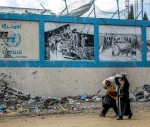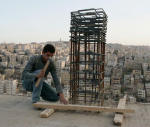You are here
Britain’s PM orders review into Muslim Brotherhood’s activities
By Reuters - Apr 01,2014 - Last updated at Apr 01,2014
LONDON — The Muslim Brotherhood’s activities in Britain will be reviewed over concerns about possible links to violence, Prime Minister David Cameron said, widening pressure on a veteran Islamist movement facing an intensifying crackdown in the Arab world.
The Brotherhood, and affiliated organisations and parties are part of the political landscape in many Arab and Islamic states where they have placed deep roots in society thanks to their involvement in social and charitable works.
It also gained political power in some Arab nations after the 2011 uprisings that toppled long-entrenched autocratic regimes. But the Brotherhood has been crushed in Egypt after the military overthrew an elected Islamist president in July, declared a terrorist organisation in Saudi Arabia, and subjected to a wave of prosecutions and jailings in Gulf Arab kingdoms leery of any spread of Islamist influence since the Arab Spring.
Britain, where many Brotherhood-influenced organisations are based, said its review would include looking at allegations made by authoritarian Arab leaders that the group was linked to violence, a charge it has repeatedly denied.
“What is important... is to make sure we fully understand what this organisation is, what it stands for, what its links are, what its beliefs are in terms of both extremism and violent extremism, what its connections are with other groups, what its presence is here in the United Kingdom,” Cameron told reporters.
A spokeswoman for Cameron said the review would examine the philosophies and values of the Muslim Brotherhood and how it operated in different countries around the world, including in the UK, as well as its impact on Britain’s national security.
Both the British domestic and foreign intelligence agencies, MI5 and MI6, would be consulted as part of the review, she added, which would focus on the activities of the Brotherhood in the wider region, not Egypt alone.
“There have been some concerns as well that have been raised about potential linkages to violent activity and some extremist groups of some of the organisations that tend to come together under the wider Muslim Brotherhood organisation,” another spokesman said. Therefore the review would look at “alleged and reported links to extremist organisations”.
The government hopes the review, being led by John Jenkins, its ambassador to Saudi Arabia, will report findings by July.
In Cairo, Foreign Ministry spokesman Badr Abdelatty said: “Egypt welcomes Britain’s decision in carrying out urgent investigations into the role the Muslim Brotherhood group carries out from British soil and the extent of the relationship between the... Brotherhood and violent activities and extremism.”
The Muslim Brotherhood Press Office in London, which has become the movement’s main communication channel since July, said it would release a statement later on Monday.
“I think there’s a definite linkage between Cameron’s announcement of investigation of the Brotherhood in the UK to Saudi Arabia and other Gulf state perceptions of the Brotherhood as a threat,” said Theodore Karasik, director of research and consultancy at the Gulf security and military think-tank INEGMA.
“The pressure point is related to the fact that an event [can] occur on the Arabian Peninsula that is tied to the Brotherhood and originates in the UK,” he told Reuters.
Egypt shatters Brotherhood
Britain’s move came amid increasing Arab repression of the Brotherhood especially in Egypt, where security forces have killed hundreds of Islamists and jailed thousands including almost all leaders of the movement since the army ousted President Mohamed Morsi after mass protests against his rule.
The military-backed authorities have banned the Brotherhood and more than 500 members have been sentenced to death for murder over deaths during clashes with security forces. Morsi faces charges that could lead to the death penalty.
The Brotherhood has reiterated a decades-long policy of non-violence, denying any connection with recent bloodshed.
Analysts say Morsi, a leading Brotherhood figure, alienated all but a hard-core constituency by devoting his energy to asserting Islamist control of Egypt’s governing institutions rather than implementing civic-minded policies to revive its paralysed economy and heal political divisions.
Still, in the wake of Morsi’s removal Britain’s Foreign Office voiced concern over the collective round-up of Brotherhood members, warning that politicised arrests would hinder Egypt’s post-2011 transition towards democracy.
Saudi Arabia, a staunch supporter of the military-buttressed governing authorities in Egypt, formally designated the Brotherhood as a terrorist organisation last month.
Riyadh fears that the group, whose Sunni Islamist doctrines challenge the Saudi principle of dynastic rule, has tried to build support in the kingdom since the Arab Spring revolutions.
Related Articles
LONDON — British Prime Minister David Cameron on Thursday ruled out banning Egypt's Muslim Brotherhood but said the group had a "highly ambi
ISTANBUL — US President Donald Trump is working to designate the Muslim Brotherhood as a foreign terrorist organisation, a move that would b
An Egyptian court sentenced 10 supporters of the outlawed Muslim Brotherhood to death in absentia on Saturday but postponed the sentencing of its leader and other senior members, judicial sources said.















